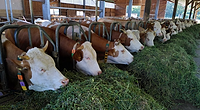USDA-FSIS Begins New RTE Sampling Program to Verify Allergen Label Claims

Image credit: Racool_studio via Freepik
On September 1, 2024, the U.S. Department of Agriculture’s Food Safety and Inspection Service (USDA’s FSIS) will implement a new allergen verification sampling program at establishments that produce ready-to-eat (RTE) products labeled with claims (e.g., “no peanuts”) about the absence of at least one of 14 food allergens.
The allergens included in the new program include soy, crustacean shellfish (e.g., crab, lobster, shrimp, etc.), eggs, peanuts, milk, and nine tree nuts including almond, Brazil nut, cashew, coconut, hazelnut, macadamia, pine nut, pistachio, and walnut. Additionally, FSIS will be testing for gluten, which can cause severe reactions in people with celiac disease or gluten sensitivity. FSIS intends to continue to develop the sampling program to include analysis for sesame.
FSIS is implementing the new program to expand its verification of industry compliance with labeling regulations. It significantly expands upon and replaces FSIS’ current soy testing program, broadening the scope to include multiple allergens and gluten, in addition to soy. The program aims to ensure the accuracy of labeling claims for allergens in RTE products, ultimately enhancing consumer safety. FSIS will be issuing a directive providing instructions to inspection program personnel for collecting samples at eligible establishments in the upcoming week.
Update, July 26, 2024: The article has been updated to reflect the new start date, which has been moved from August 1 to September 1, 2024. The agency also issued two new directives related to the new sampling program:
- Directive 7000.6 provides instructions to inspection program personnel (IPP) for collecting samples in the allergen verification sampling program. This program targets establishments producing RTE products with labeling claims related to at least one of the 14 food allergens or gluten.
- Directive 7000.5 instructs IPP on labeling claims verification sampling at establishments producing products in consumer-ready packaging that bear certain labeling claims or a nutrition facts panel, based on specific eligibility criteria.
Additionally, FSIS laboratories have implemented a new method, titled, “Screening and Confirmation of Allergens by XMAP® Food Allergen Detection Assay” (CLG-ALG1) to support the upcoming sampling program. The method is applicable to screen and confirm soy, crustacean shellfish, eggs, peanuts, milk, nine tree nuts (almond, Brazil nut, cashew, coconut, hazelnut, macadamia, pine nut, pistachio, and walnut), and gluten allergens in RTE products. The method is available on the Chemistry Laboratory Guidebook.
Looking for a reprint of this article?
From high-res PDFs to custom plaques, order your copy today!






